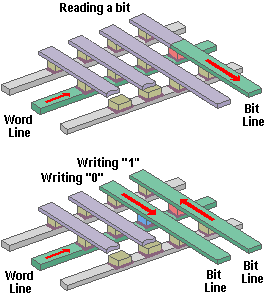In late 2000 IBM and German semiconductor company Infineon Technologies AG announced plans to collaborate in the development of Magnetic Random Access Memory (MRAM) – a breakthrough memory technology that could significantly increase battery life of portable computing devices and lead to instant-on computers.
Originating from IBM’s pioneering development of a miniature component called the magnetic tunnel junction as long ago as 1974, MRAM uses a magnetic charge – similar to a hard drive’s – to store information, as opposed to the electric charge of existing memory forms. The chips work by storing the ones and zeros that compose digital data in a magnetic material that is sandwiched between two metal layers.

Its proponents claim the new technology combines the best virtues of many of the common forms of memory – the low cost and high capacity of dynamic RAM; the high speed of static RAM; and the permanence of Flash memory – and has the potential to significantly improve many electronic products by storing more information, accessing it faster and using less battery power than conventional electronic memory.
Since MRAM also retains information when power is turned off, it means that products like personal computers could start up instantly, without waiting for software to boot up. Non-volatility also means reduced power consumption. Since it will not need constant power to keep the data intact, MRAM could consume much less than established random access memory technologies, extending the battery life of cell phones, handheld devices, laptops and other battery powered products.
By early 2002, it should be clear whether the technology can be scaled down enough to make it feasible and whether the magnetic material can be worked into traditional chipmaking processes. If so, it is expected that actual MRAM products could be commercially available as soon as 2004, and that the technology could represent a serious threat to the various silicon-based memory chips towards 2010.
- What is Level 1 (L1) Cache Memory?
- What is L2 (Level 2) cache memory?
- RAM or Main Memory – PC / computer memory (DIMM, DRAM, SDRAM)
- DRAM – Dynamic Random Access Memory
- FPM DRAM
- EDO (Extended Data Out) and BEDO (Burst Extended Data Out) DRAM
- SDRAM
- PC133 SDRAM
- DDR SDRAM explained
- DDR2 DRAM
- Dual Channel DDR Memory
- 1T SRAM
- Direct DRAM
- SIMMs
- DIMM Memory
- RIMMs Memory
- Memory Presence Detection
- Parity Memory
- ECC Memory
- Memory Upgrades
- The Evolution of Memory
- Flash Memory
- Magnetic RAM